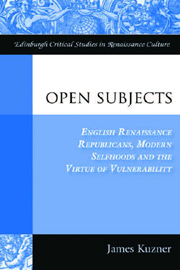Book contents
- Frontmatter
- Contents
- Acknowledgements
- Series Editor's Preface
- Introduction: Vulnerable Crests of Renaissance Selves
- 1 Legacies of Republicanism, Histories of the Self
- 2 ‘Without Respect of Utility’: Precarious Life and the Politics of Edmund Spenser's Legend of Friendship
- 3 Unbuilding the City: Coriolanus, Titus Andronicus and the Forms of Openness
- 4 ‘That Transubstantiall solacisme’: Andrew Marvell, Linguistic Vulnerability and the Space of the Subject
- 5 Habermas Goes to Hell: Pleasure, Public Reason and the Republicanism of Paradise Lost
- Epilogue: The Futures of Open Subjects
- Index
Epilogue: The Futures of Open Subjects
Published online by Cambridge University Press: 12 September 2012
- Frontmatter
- Contents
- Acknowledgements
- Series Editor's Preface
- Introduction: Vulnerable Crests of Renaissance Selves
- 1 Legacies of Republicanism, Histories of the Self
- 2 ‘Without Respect of Utility’: Precarious Life and the Politics of Edmund Spenser's Legend of Friendship
- 3 Unbuilding the City: Coriolanus, Titus Andronicus and the Forms of Openness
- 4 ‘That Transubstantiall solacisme’: Andrew Marvell, Linguistic Vulnerability and the Space of the Subject
- 5 Habermas Goes to Hell: Pleasure, Public Reason and the Republicanism of Paradise Lost
- Epilogue: The Futures of Open Subjects
- Index
Summary
In considering the history of selfhood, I have at points also considered how selves can and should go about shaping their futures. The last chapter, for instance, focused on how we can use critical discipline to alter the degree to which we are vulnerable – to others, to their words and to the structures of the world. An underlying question had to do with whether, in managing how structures affect us, we might enduringly affect them.
For Habermasian critics of Milton, the answer is yes. Rational conversation at its best leads to agreement about how the legislative sphere might bring about a definite, improved future for the bounded self. Indeed, the republican criticism with which I have taken issue in this book invests in boundedness not just as a practice of the self (of self-protection) but also as what legislation can help secure, more or less in perpetuity. I have shown how such investment is evident not just in Milton studies but in Richard Chamberlain's account of the boundary-respecting politics of friendship in The Faerie Queene; in Patterson's admiration of the Roman citizens' demands for free speech and for protection against Coriolanus; and in the high marks that she and Norbrook give to Maria Fairfax for her supposedly proto-liberal powers of self-possession. In these literary accounts as well as in many historical and political ones, the greatest value of our social practices – our friendships and our civic lives, our private conversations and our public arguments – rests in how they can guarantee personal boundaries, including and perhaps especially when the guarantee comes in lasting, legislative form.
- Type
- Chapter
- Information
- Open SubjectsEnglish Renaissance Republicans Modern Selfhoods and the Virtue of Vulnerability, pp. 208 - 211Publisher: Edinburgh University PressPrint publication year: 2011



